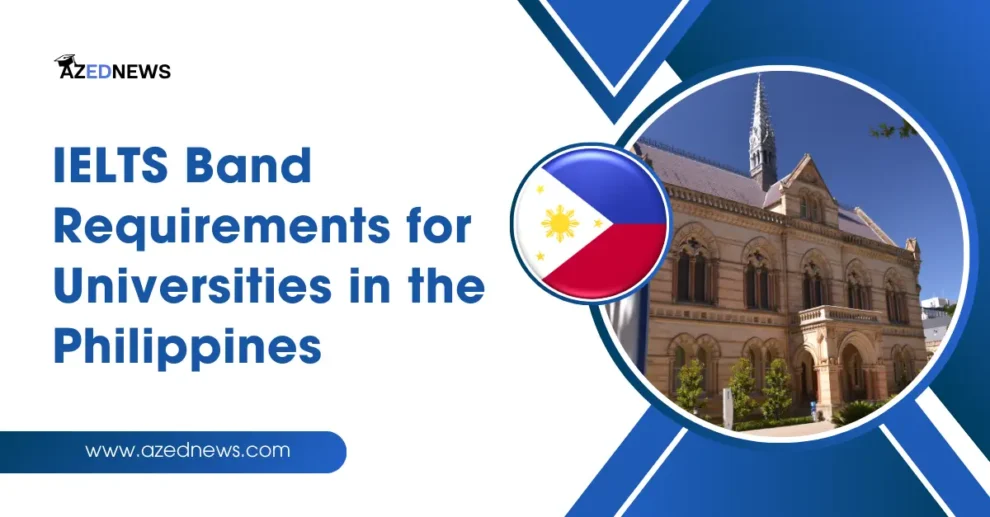If you want information on IELTS Band Requirements for Universities in the Philippines, don’t worry we have covered a detailed article for you. The Philippines, a newly industrialized nation and rising Asian market welcomes overseas students pursuing higher education. In addition to being a well-liked travel destination due to its bright, tropical beaches and lovely coastline, the Philippines is home to a large number of students from a variety of cultural backgrounds.
Table of Contents
The intriguing fusion of Malay, American, Spanish, and Islamic influences on Filipino culture is experienced by international students. Most significantly, it is regarded as having one of Asia’s top educational systems, particularly for postsecondary education.
It is noteworthy that the country located in Southeast Asia is rated 46th in the first edition of the exclusive QS Higher Education Strength Rankings. IELTS is accepted by most universities in the Philippines as proof of English language proficiency.
Key Takeaways:
- Studying in the Philippines requires students to clear IELTS which is an English proficiency test accepted throughout the world.
- There are various requirements that students have to fulfill to get accepted in the Philippines such as submitting IELTS score proof.
- To get a study permit in the Philippines students have to submit their score card for an English proficiency test.
- The IELTS band score in the Philippines ranges from 0 which means the test wasn’t attempted to 9 which means the applicant is an expert.
- Various top universities in the Philippines like the University of the Philippines Diliman and De La Salle University offer admission to students based on a minimum IELTS score of 6.5 bands.
What are the IELTS Band Requirements for Universities in the Philippines to study?
- To be eligible for the study abroad program in the Philippines, all overseas students need to have finished grade five or higher in elementary school.
- It is not necessary to speak English fluently to apply for a basic English course. Depending on the degree you are enrolled in, there will be varying prerequisites for exam preparation classes.
- Students must be in excellent health and not be receiving discipline or being called upon by the authorities at any time.
- Financial resources must be sufficient for students to pay for their education.
- To be eligible to apply for a student visa, a passport must be valid for more than six months. Despite the very short course duration, passport validity is crucial.
- It’s much easier than you might expect to apply for an English course in the Philippines.
- The only thing left to do is get ready for the application process, which should include researching Philippine schools and courses.
- Comply with the relevant application processes. Await the school’s admission letter, tuition notification, and the deadline for paying any outstanding costs.
- The fact that the school will assist you with completing administrative tasks like applying for SSP, renewing your visa, creating an ACR I-Card, etc., is another perk of studying in the Philippines.
- As a result, you may concentrate on honing your English proficiency rather than worrying about any procedures.
- If you want to get better at speaking and listening, you can take a Power Speaking/Speaking Master course or a beginner-level course like an ESL general communication.
- Furthermore, there are numerous other courses available, including Business English, IELTS, and TOEIC.
How to get a study permit for the Philippines?
International students who dream of studying in the Philippines will be required to earn a student visa from the Philippine consulate in their home country before getting accepted into their desired university.
To get a student visa, students will be required to submit relevant documents, attend the visa interview, and pay the visa fee. The requirements vary hence it is advised to check the Philippine embassy website during the visa application process.
In general, students will have to submit the following documents:
- Passport
- Visa application form
- Medical health certificate
- Letter of acceptance from the university
- ID photos
- Birth certificate
- Educational documents
- Proof of funds
Upon this, a special study permit is issued to the international student who is below the age of 18 or is taking a non-degree course in the Philippines. This is a permit and not a visa and is only issued under the temporary visitor visa of a foreign national.
What is the IELTS band score in the Philippines?
The IELTS is a test to measure English proficiency. The lowest reported test score is 1 and the highest is 9 bands. The IELTS score band is decoded in the following way:
- 9 – Expert User
- 8 – Very Good User
- 7 – Good User
- 6 – Competent User
- 5 – Modest User
- 4 – Limited User
- 3 – Extremely Limited User
- 2 – Intermittent User
- 1 – Non User
- 0 – Did not attempt the test
The universities that provide higher education and employers in this country ask for applicants’ qualifications in English and use the IELTS band score to measure it. There are no fixed criteria for the accepted band score by individual institutions.
However, a test score which is above 5.5 is a basic requirement. However, scoring better in IELTS will naturally increase the chances of getting accepted in the Philippines.
Another popular country in Asia that people often pick for pursuing higher education is China. The IELTS Band Requirements for Universities in China are more or less similar to the ones in the Philippines and are easily achievable by most students.
Why do universities in the Philippines choose IELTS?
- It demonstrates the ability to communicate in a face-to-face setup:
IELTS allows you to speak with an examiner face-to-face in a comfortable and encouraging setting, in contrast to other language competency tests where you must speak to a machine throughout your Speaking test.
- It will help students build skills relevant to their studies:
IELTS emphasizes the importance of your ability to communicate in real-world settings. It is not required to commit a significant amount of vocabulary or grammar to crack this test. Instead, IELTS focuses on teaching you how to speak in a variety of situations that you would come across in educational settings. This will enable you to excel in your coursework and overall academic experience.
List of the Top Universities in the Philippines
1. University of the Philippines Diliman

The University of the Philippines Diliman is a non-profit public higher education institution that was established in 1908 and is situated in a rural area of Quezon City, a city in the National Capital Region with a population between one million and five million people. Additionally, this university maintains branch campuses in the cities of San Fernando and Olongapo City.
University of the Philippines Diliman (UPD) is a sizable coeducational university in the Philippines that has been officially recognized by the Commission on Higher Education of the Philippines. The University of the Philippines Diliman (UPD) provides courses and programs in a variety of subject areas that lead to legally recognized higher education degrees, including bachelor’s and master’s degrees.
- Accepted IELTS score: 5.5 bands
- Acceptance rate: 12%
- Location: In Roxas Avenue
- University ranking: 404
2. De La Salle University
De La Salle University, a private, non-profit university founded in 1911, is situated in the National Capital Region’s Manila, an urban area with a population of one million to five million people. Additionally, this university maintains branch campuses in Makati, Bonifacio Global City, and Laguna.
De La Salle University is a major coeducational university in the Philippines that is officially recognized by the Commission on Higher Education of the Philippines. It is publicly associated with the Christian-Catholic faith. In several subject areas, De La Salle University provides courses and programs leading to officially recognized higher education degrees, including pre-bachelor’s, bachelor’s, master’s, and doctorate degrees.
- Accepted IELTS score: 6.0
- Acceptance rate: 94.2%
- Location: 2401 Taft Avenue
- University ranking: 201
3. Ateneo De Manila University

The Ateneo de Manila University is a private, non-profit university situated in Quezon City, the capital of the National Capital Region, and was established in 1859. Additionally, this university maintains branch campuses in Makati City and Rockwell.
Ateneo de Manila University is a major coeducational university in the Philippines that is officially recognized by the Commission on Higher Education of the Philippines.
It is publicly associated with the Christian-Catholic religion. In several subject areas, Ateneo de Manila University provides courses and programs leading to degrees in higher education that are officially recognized, including bachelor’s, master’s, and doctorate degrees.
- Accepted IELTS score: 6.5
- Acceptance rate: 42%
- Location: Katipunan Avenue
- University ranking: 563
4. Polytechnic University of the Philippines

The Polytechnic University of the Philippines is a public, non-profit university situated in the National Capital Region’s Manila metropolitan area and was founded in 1904. Polytechnic University of the Philippines is a very big coeducational higher education school in the Philippines that is officially recognized by the Commission on Higher Education of the Philippines.
The Polytechnic University of the Philippines provides a variety of courses and programs that lead to degrees in higher education that are officially recognized, including pre-bachelor, bachelor, master, and doctorate degrees.
- Accepted IELTS score: 5.5
- Acceptance rate: 40%
- Location: 1016 Anonas
- University ranking: 5758
5. University of the Philippines System
The University of the Philippines System is a public, non-profit university situated in the metropolitan environment of Quezon City, in the National Capital Region. It was founded in 1908.
University of the Philippines System is a very big coeducational university in the Philippines that has been officially recognized by the Commission on Higher Education of the Philippines.
The University of the Philippines System provides courses and programs in many subject areas that lead to legally recognized higher education degrees, including pre-bachelor, bachelor’s, master’s, and doctorate degrees.
- Accepted IELTS score: 5.5
- Acceptance rate: 10-19%
- Location: Diliman
- University ranking: 404
6. University of Santo Tomas

The University of Santo Tomas is a private, non-profit university situated in the National Capital Region’s Manila metropolitan and was founded in 1611. University of Santo Tomas is a major coeducational university in the Philippines that is officially recognized by the Commission on Higher Education of the Philippines.
It is publicly associated with the Christian-Catholic religion. In several subject areas, the University of Santo Tomas provides courses and programs leading to degrees in higher education that are officially recognized, including bachelor’s, master’s, and doctorate degrees.
- Accepted IELTS score: 6.5
- Acceptance rate: 90%
- Location: 1008 Manila
- University ranking: 2652
Frequently Asked Questions
1. Which course in the Philippines is the best?
While there are many different degree programs available in the Philippines, MBBS is one of the most well-known degrees. In addition, the institutions in the Philippines are well known for their programs in agriculture, information technology, engineering, and management.
2. What is the passing score of IELTS in the Philippines?
IELTS does not have a pass/fail score. Your test scores are given in half-band increments, ranging from 1.0, the lowest, to 9.0, the greatest. Together with individual band scores for the Listening, Reading, Writing, and Speaking test sections, you will also obtain an overall band score.
3. Is IELTS compulsory to study in the Philippines?
The Philippines accepts IELTS as proof of English language proficiency. You’ll probably need to submit your IELTS results with your application if you’re hoping to study in the Philippines for an undergraduate or graduate degree.
4. Do you need IELTS to do a master’s in the Philippines?
You do not need to take the TOEFL or IELTS exams to enroll in an MD program in the Philippines. Nonetheless, to get admitted to Philippine medical colleges, you must take the NMAT exam.
5. How to study in the Philippines from India?
After being accepted to a Filipino university, all overseas students must apply for a student visa from the Philippine embassy or consulate in their home country.
Conclusion:
The Philippines is becoming a popular study-abroad destination in Asia because to its many colleges that offer a wide variety of courses. The courses given by the universities and colleges are structured academically and have excellent research facilities. The degrees offered are Bachelor’s and Master’s.
The low cost of universities in the Philippines will delight overseas students. Tuition for both private and public universities is between 500 and 2,000 EUR per academic year. Certain study programs have no set fees; in these cases, the tuition is determined by the quantity of credits or courses taken.












Add Comment